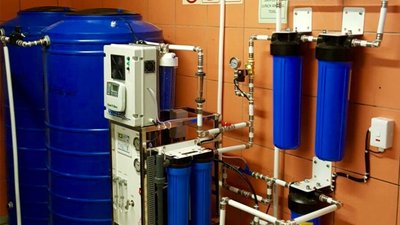Contact Details:
Ozone Services Industries (OSI)
Unit 21, Industrial Village
22 Elsecar Street
Kya Sands
Gauteng
South Africa
Tel: +27 (0) 791 4403
Fax: +27 (0)11 462 5456
Send Enquiry | Company Information

Good Neighbours Recycle & Reuse
Product News Monday, August 22, 2016: Ozone Services Industries (OSI)
Few consumers are aware that food and beverage manufacturers reuse water and even fewer consumers realise that the practice is essential as the industry that literally provides us with our daily bread uses so much potable water that it could negatively impact drinking water reserves.
"Without reclaiming and recycling the water used in food and beverage manufacturing facilities in industrial areas, water supply in neighbouring residential areas would be erratic at best," says Len Oort of Ozone Servives Industries. The company is a supplier of waste water treatment units that purify water using a water analysis of the raw water to determine the most effective technology.
OSI’s unique water disinfection speciality developed over two decades is the use of naturally-occurring ozone gas at high levels to oxygenate water to the point where reused and recycled water is safe to drink.
Reclaimed water is typically used in non-product applications within the food and beverage industry. These include landscape irrigation, truck washing and warehouse floor washing. "Because dwindling water reserves will eventually force the use of reclaimed water directly in the food and beverage manufacturing process, it is good to know that ozone-based technology already exists to safely and affordably purify reused and recycled water to the point where it is safe for consumption," says Mr Oort.
The fact that ozone is a naturally-occurring disinfectant is a tremendous boon to the food and beverage industry. Approved as far back as 1999 as a disinfectant for Food Preparation by the American Food & Drug Administration and the Environmental Protection Agency, ozone's recognised strong suite is that it reverts back to oxygen rapidly after it has disinfected. There is no residual odour or bad taste.
If one compares the chemical molecule O3 (ozone) to Cl (chlorine) one finds that ozone is 2.5 times stronger than chlorine and works 3 000 times faster because it kills bacteria on contact. Chlorine's only real advantage, and it's one that appeals to pool owners, is that it ensures residual protection long after it is added to water. However, that's not much of a plus in the food industry where one wants the product to be tasted, not the cleanser. Another huge advantage of ozone in the food and beverage industry is that ozone is not required to be indicated on labels and that's a big plus for organic foods manufacturers.
"Reclaiming and recycling water is one method food and beverage manufacturing facilities can employ to alleviate business risk, enhance sustainability practices and safeguard water quality standards. Ozone is an effective enabler of all of this," concludes Mr Oort.
More information is available at www.ozonize.co.za.
